Related Research Articles
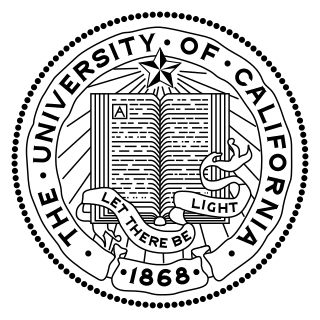
The University of California (UC) is a public land-grant research university system in the U.S. state of California. Headquartered in Oakland, the system is composed of its ten campuses at Berkeley, Davis, Irvine, Los Angeles, Merced, Riverside, San Diego, San Francisco, Santa Barbara, and Santa Cruz, along with numerous research centers and academic centers abroad. The system is the state's land-grant university.

The University of California, Berkeley is a public land-grant research university in Berkeley, California, United States. Founded in 1868 and named after the Anglo-Irish philosopher George Berkeley, it is the state's first land-grant university and is the founding campus of the University of California system.

The University of California, San Diego is a public land-grant research university in San Diego, California, United States. Established in 1960 near the pre-existing Scripps Institution of Oceanography in La Jolla, UC San Diego is the southernmost of the ten campuses of the University of California. It offers over 200 undergraduate and graduate degree programs, enrolling 33,096 undergraduate and 9,872 graduate students, with the second largest student housing capacity in the nation. The university occupies 2,178 acres (881 ha) near the Pacific coast.

Stanford Law School (SLS) is the law school of Stanford University, a private research university near Palo Alto, California. Established in 1893, Stanford Law had an acceptance rate of 6.28% in 2021, the second-lowest of any law school in the country. George Triantis currently serves as Dean.
In psychology and cognitive science, a schema describes a pattern of thought or behavior that organizes categories of information and the relationships among them. It can also be described as a mental structure of preconceived ideas, a framework representing some aspect of the world, or a system of organizing and perceiving new information, such as a mental schema or conceptual model. Schemata influence attention and the absorption of new knowledge: people are more likely to notice things that fit into their schema, while re-interpreting contradictions to the schema as exceptions or distorting them to fit. Schemata have a tendency to remain unchanged, even in the face of contradictory information. Schemata can help in understanding the world and the rapidly changing environment. People can organize new perceptions into schemata quickly as most situations do not require complex thought when using schema, since automatic thought is all that is required.
Dedre Dariel Gentner is an American cognitive and developmental psychologist. She is the Alice Gabriel Twight Professor of Psychology at Northwestern University, and a leading researcher in the study of analogical reasoning.

The University of California, Los Angeles School of Law is the law school of the University of California, Los Angeles.

The American University Washington College of Law is the law school of American University, a private research university in Washington, D.C. It is located on the western side of Tenley Circle in the Tenleytown section of northwest Washington, D.C. The school is accredited by the American Bar Association and a member of the AALS.
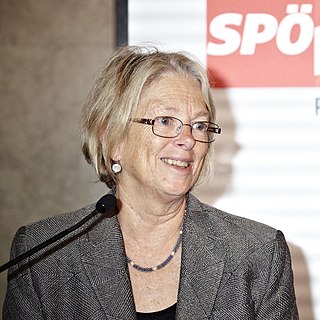
Pamela Samuelson is an American legal scholar, activist, and philanthropist. She is the Richard M. Sherman '74 Distinguished Professor of Law at the University of California, Berkeley, School of Law, where she has been a member of the faculty since 1996. She holds a joint appointment at the UC Berkeley School of Information. She is a co-founder of Authors Alliance and a co-director of the Berkeley Center for Law and Technology.
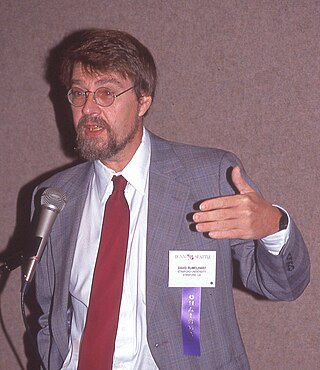
David Everett Rumelhart was an American psychologist who made many contributions to the formal analysis of human cognition, working primarily within the frameworks of mathematical psychology, symbolic artificial intelligence, and parallel distributed processing. He also admired formal linguistic approaches to cognition, and explored the possibility of formulating a formal grammar to capture the structure of stories.
DePaul University College of Law is the law school of DePaul University, a private Catholic research university in Chicago, Illinois. It employs more than 125 full- and part-time faculty members and enrolls more than 500 students in its Juris Doctor program. The school is recognized for its health law and intellectual property law programs, its experiential learning opportunities, and for its multiple joint degree programs offered in conjunction with other DePaul University colleges and schools.

The University of Colorado Law School is one of the professional graduate schools within the University of Colorado System. It is a public law school, with more than 500 students attending and working toward a Juris Doctor or Master of Studies in Law. The Wolf Law Building is located in Boulder, Colorado, and is sited on the south side of the University of Colorado at Boulder campus. The law school houses the William A. Wise Law Library, which is a regional archive for federal government materials and is open to the public. United States Supreme Court Justice Wiley Blount Rutledge graduated from the University of Colorado Law School in 1922.
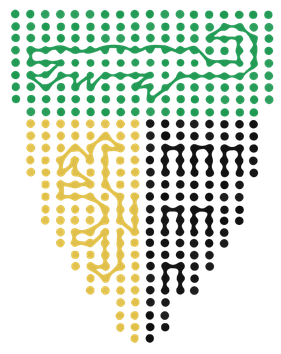
The Information Society Project (ISP) at Yale Law School is an intellectual center studying the implications of the Internet and new information technologies for law and society. The ISP was founded in 1997 by Jack Balkin, Knight Professor of Constitutional Law and the First Amendment at Yale Law School. Jack Balkin is the director of the ISP.
The Samuelson-Glushko Canadian Internet Policy and Public Interest Clinic (CIPPIC) is a legal clinic at the University of Ottawa focused on maintaining fair and balanced policy making in Canada related to technology. Founded in the fall of 2003 by Michael Geist, its headquarters is at the University of Ottawa Faculty of Law, Common Law Section.

Laura Quilter is a writer, lawyer, librarian, professor, and science fiction fan known for both her work on intellectual property and new media, and her long-standing archive of information on feminist science fiction.
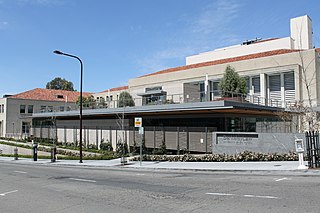
The University of California, Berkeley School of Law is the law school of the University of California, Berkeley. The school was commonly referred to as "Boalt Hall" for many years, although it was never the official name. This came from its initial building, the Boalt Memorial Hall of Law, named for John Henry Boalt. This name was transferred to an entirely new law school building in 1951 but was removed in 2020.

Peter Jaszi is a widely known expert on copyright law and author, with Patricia Aufderheide, of Reclaiming Fair Use (2012), which examines the state of fair use and the importance to scholarship, art, and free expression of strengthening the doctrine.

Colleen V. Chien is an American legal scholar who is a law professor at UC Berkeley School of Law, where she teaches, mentors students, and conducts cross-disciplinary research on innovation, intellectual property, and the criminal justice system, with a focus on how technology, data, and innovation can be harnessed to achieve their potential for social benefit.
During the years of increasing awareness of the Washington Redskins name controversy, public opinion polls were part of the discussion about whether Native Americans found the term redskin insulting. Other polls gauged how the general public viewed the controversy.
References
- ↑ "Robert Glushko, Adjunct Professor". UC Berkeley School of Information. Retrieved 26 February 2013.
- ↑ "The Discipline of Organizing. Version 1: 2013". The Discipline of Organizing. Retrieved 24 January 2020.
- 1 2 "Robert J. Glushko Home Page". UC Berkeley School of Information. Retrieved 17 September 2013.
- ↑ "The David E. Rumelhart Prize" . Retrieved 17 September 2013.
- ↑ "Glushko-Samuelson Intellectual Property Law Clinic of the Washington College of Law". American University. Retrieved 17 September 2013.
- ↑ "Samuelson Law, Technology & Public Policy Clinic". UC Berkeley School of Law. Retrieved 17 September 2013.
- ↑ "Samuelson-Glushko Intellectual Property and Information Law Clinic". Fordham University. Archived from the original on 20 December 2013. Retrieved 17 September 2013.
- ↑ "Samuelson-Glushko Technology Law & Policy Clinic". Colorado Law, University of Colorado, Boulder. Retrieved 17 September 2013.
- ↑ "About Us - CIPPIC". CIPPIC, University of Ottawa. Retrieved 25 May 2015.
- ↑ Claire Caraska; Malinda Danziger; Mary Johnson (May 2011). "Alumni Leaders". At UCSD. 8 (2). UCSD Alumni Association.
As of this edit, this article uses content from "Robert J. Glushko Home Page" , which is licensed in a way that permits reuse under the Creative Commons Attribution-ShareAlike 3.0 Unported License, but not under the GFDL. All relevant terms must be followed.